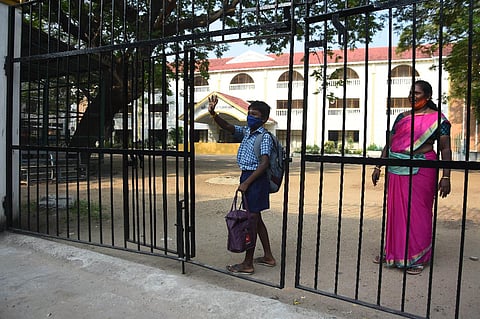

HYDERABAD: Even as parents continue to struggle with the question of whether or not to send children to offline classes, doctors in Hyderabad point out that the Omicron variant induced third wave was rather mild amongst the younger population. Though children exhibited stronger symptoms as compared to the previous waves with high fever, cough, cold etc, a majority recovered with home treatment itself.
“In the third wave, instances of high-grade fever affected 95 per cent of the young patients. These fevers recurred every four to five hours and took nearly five days to resolve. This was different from the first two waves when only a few children were symptomatic,” explained Dr Mahishma K, consultant paediatrician and Assistant Professor, Shadan School of Medical Sciences.
“In this wave, very few hospitalisations were seen in kids. For instance, infants with high-grade fever and poor oral intake, dehydration or children with febrile seizures who tested positive for Covid-19 were hospitalised. These were very small even as overall there was an exponential rise in Covid-19 infections among paediatric patients,” said Dr Chetan R Mund-ada, lead paediatric intensivist, Yashoda Hospitals, Hyderabad.
However, these seemingly mild infections come at a cost, point out experts.“In this wave specifically, we are seeing post-Covid symptoms in children, similar to the ones faced by adults. Brain fog for instance is a very common post-Covid complication seen in the unvaccinated children who are forgetting what they learnt a few months ago, unable to recall some tasks etc,” said Dr Mahishma. For such cases, the only option is to train the brain again with small puzzles and crosswords and family group activities to keep the child sharp, she suggested.
The dangers of the deadly post -Covid complication MIS-C (Multi-Inflammatory Syndrome) can’t also be ruled out just yet, doctors said. “So far, we haven’t noticed any surge of MIS-C children in the city. One reason can be that we are still early in the trajectory of MIS-C; in earlier waves, there was a lag of 4-6 weeks between the peak incidence of Covid infections and the appearance of MIS-C cases. Secondly, in this wave gastrointestinal symptoms like vomiting and loose motions were seen in fewer children as compared to earlier waves. The gastrointestinal sy-stem has been proposed to have a major role in MIS-C pathogen-esis. We need to observe them over the next one month or so for any occurrence of MIS-C in clusters,” said Dr Chetan Mundada.